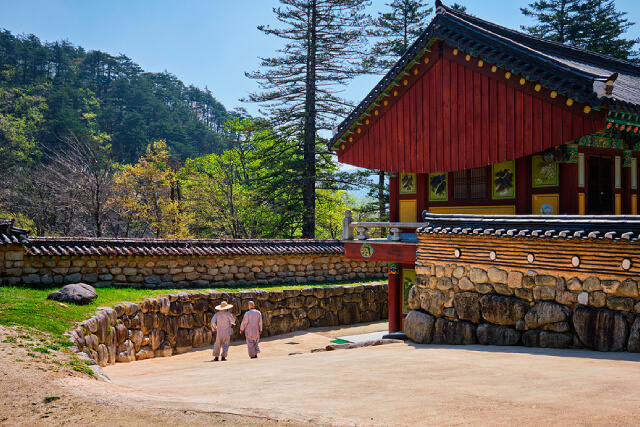You hear nothing but the chirping of the birds as the mountain breeze caresses your skin, along with the calming sound of water trickling down the stream nearby. If this sounds like your dream vacation, this pleasant sight will be an everyday experience at a temple stay in South Korea.
Temple Stay
The temple stay programme has its unlikely origins in the World Cup co-hosted by both Japan and South Korea, back in 2002. In hopes to overcome the shortage of hotel accommodations, the government proceeded to make a general appeal for help, to which the Jogye Order responded. The country’s largest Buddhism sect then began to open its temples to short-term paying guests and offered the appeal of respite from the hustle and bustle of typical city life.
Fortunately, you don’t have to be proficient in the Korean language, nor do you need to pick up the basics in a Korean language course. There are several temples offering such programmes in English!
If you’re keen to rejuvenate your soul and body, dive into some of the activities conducted during a temple stay, and the etiquette you should always practise throughout the entire duration.
Temple Stay Activities
Depending on the location and particular spiritual focus, the temple will curate a structured programme and activities where you’ll learn their prayers, attend morning and evening ceremonies, eat vegan food, meditate and more. These programmes vary from temple to temple but here are a few commonalities they’ll share.
1.Yebul: Ceremonial Service
Each day begins with a ceremonial service where you’ll pay your respects to the Buddha enshrined in the Dharma hall. Apart from reading aloud the Heart Sutra and Buddhist chants, you’ll also execute 108 prostrations to the Buddha. Whilst this may sound rather uncomfortable and unfamiliar to the city-folk, such actions help clear out any form of material desires from the heart, mind and body.
This daily routine is repeated 3 times throughout the day: once before dawn, another at 10 in the morning and one in the evening.
2.Chamseon: Zen Meditation
Setting one of the key foundations of Buddhist practices, Buddhist monks pursue meditation as part of the path towards liberation, enlightenment and Nirvana. Zen meditation, in particular, is a meditation technique that promotes self-reflection and introspection in oneself.
There will be 2 forms of meditation you can opt for: haengseon (walking meditation) where you’ll walk around the beautiful naturistic spots, and jwaseon (seated meditation) which will take place on the temple grounds.
3.Barugongyang: Monastic Meal
In most cultures, communal eating is practised with aims to promote social bonding, one’s feelings of contentedness and sense of community. At these temple stays, you’re able to take part in a type of communal eating, but with a little twist.
Meals are eaten in complete silence, and one is expected to eat everything, down to the last grain of rice. Since it’s against Buddhist beliefs to hurt and harm animals, expect to be served with vegetarian meals. You are free to add more to your plate, so long as you don’t waste anything.
4.Dado: Tea Ceremony
As one of the long-standing customs in Korean traditions, tea ceremonies pay special attention to spiritual awakening, a sort of enlightenment that embodies purification, mediation and absorption.
To truly appreciate the tea, start by immersing yourself in the process, from the boiling of the water, the subtle fragrance that’ll slowly permeate the room to the warmth of the cup as you savour its taste. Whilst mundane, this practice of being present in even the smallest actions and events will help you cultivate a state of mindfulness.
Etiquette Rules To Keep An Eye On
Apart from being a place of respite from the cities, these temples are also a site of cultural and historical preservation. It’s thus important to keep in mind the rules and regulations, lest you do something deemed offensive. Here are a few:
- Refrain from speaking in loud voices. You’re also not allowed to sing or play any music.
- Refrain from stomping or running.
- Physical contact between the two genders is strictly forbidden.
- No indulging of vices such as smoking and drinking.
- No eating of meat.
Take a trip down to the picturesque spots in Korea to embark in a self-discovery journey and adopt new perspectives you’d otherwise miss. An experience like no other, take a step away from your clamouring and fast-paced lifestyle to rejuvenate your mind, soul and body. These temple stay programmes will allow you to witness something that even a Korean language school can’t offer – and you’re guaranteed to love every bit of it.


